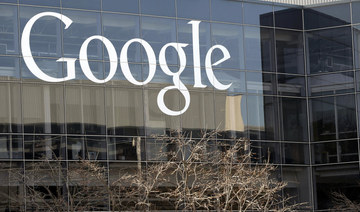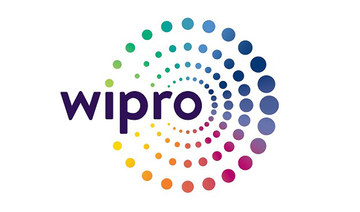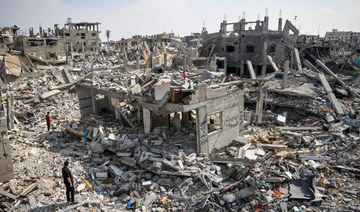SAN FRANCISCO: A group of states led by Texas is expected to announce an investigation into Google on Monday to examine whether the Silicon Valley tech giant has gotten too big and effective at stomping or acquiring rivals.
The probe is the latest blow against big tech companies as antitrust investigations ramp up in the US and around the world. A separate group of states announced an investigation into Facebook’s dominance on Friday. The Department of Justice , the Federal Trade Commission and Congress are also conducting probes.
Texas Attorney General Ken Paxton has said only that the investigation will look at “whether large tech companies have engaged in anticompetitive behavior that stifled competition, restricted access, and harmed consumers.” Reports in The Washington Post and The Wall Street Journal say Google will be the primary target.
Google expects state attorneys general will ask it about past similar investigations in the US and internationally, senior vice president of global affairs Kent Walker wrote in a blog post Friday .
Google’s parent company, Alphabet, has a market value of more than $820 billion and controls so many aspects of the Internet that it’s hard to imagine surfing the web for long without running into at least one of its services. Experts believe the antitrust probe could focus on at least one of three aspects of Google’s business that have caught regulators’ eyes.
An obvious first place to look could be online advertising. Google will control 31.1% of global digital ad dollars in 2019, according to eMarketer estimates, crushing a distant second place Facebook. And many smaller advertisers have argued that Google has such a stranglehold on the market that it becomes a system of whatever Google says, goes — because the alternative could be not reaching customers.
“There’s definitely concern on the part of the advertisers themselves that Google wields way too much power in setting rates and favoring their own services over others,” said Jen King, the director of privacy at Stanford’s Center for Internet and Society.
Critics often point to Google’s 2007 acquisition of online advertising company DoubleClick as pivotal to its advertising dominance.
Europe’s antitrust regulators slapped Google with a $1.7 billion fine in March unfairly inserting exclusivity clauses into contracts with advertisers, disadvantaging rivals in the online advertising business.
Another visibly huge piece of Google’s business is its search platform, often the starting point for millions of people when they go online. Google dwarfs other search competitors and has faced harsh criticism in the past for favoring its own products over competitors at the top of search results. European regulators have also investigated here — ultimately fining Google for promoting its own shopping service. Google is appealing the fine.
Google has long argued that although its businesses are large, they are useful and beneficial to consumers. But it appears regulators are growing more concerned not just with the effects on regular Internet users, but on smaller companies as well.
“On the one hand, you could just say, ‘well Google is dominant because they’re good,’” King said. “But at the same time, it’s created an ecosystem where people’s whole Internet experience is mediated through Google’s home page and Google’s other products.”
One outcome antitrust regulators might explore is forcing Google to spin off search as a separate company, she said.
Then there’s Google’s smartphone operating system, Android. Another acquisition of Google’s, the system is the most widely used in the world.
European regulators have also fined Google to the tune of $5 billion for tactics involving Android, finding that Google forced handset makers to install Google apps, thereby increasing its reach. Google has since allowed more options for alternative browser and search apps to European Android phones.
It’s also possible US states won’t follow in Europe’s footsteps. They could, for instance, focus on areas such as Google’s popular video site YouTube, yet another acquisition Google made, that time in 2006.
Google executive Walker emphasized that the company’s products help people every day.
“Google is one of America’s top spenders on research and development, making investments that spur innovation: Things that were science fiction a few years ago are now free for everyone_translating any language instantaneously, learning about objects by pointing your phone, getting an answer to pretty much any question you might have,” he wrote.
States expected to target Google in new antitrust probe
States expected to target Google in new antitrust probe
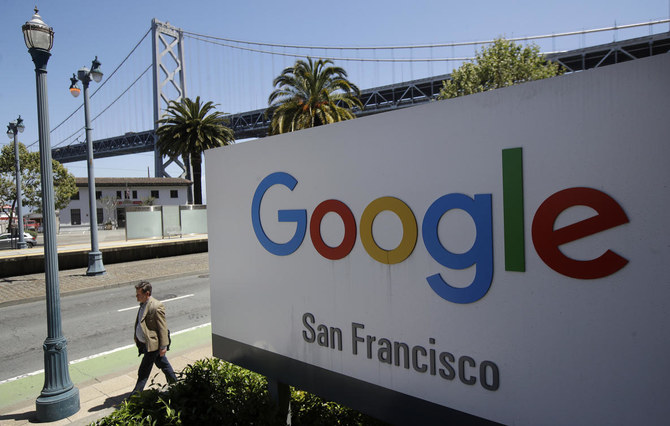
- The probe is the latest blow against big tech companies as antitrust investigations ramp up in the US and around the world
- Texas Attorney General Ken Paxton has said only that the investigation will look at “whether large tech cmpanies have engaged in anticompetitive behavior that stifled competition, restricted access, and harmed consumers”
Several Google employees fired, arrested after ‘Googlers Against Genocide’ sit-in protests
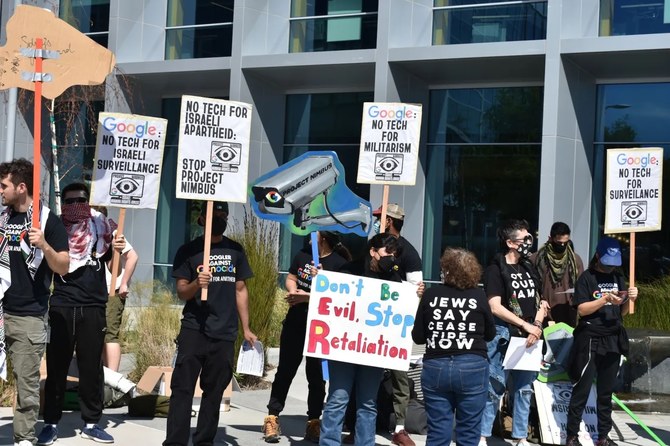
- Outrage over tech giant’s $1.2bn Project Nimbus contract with the Israeli military
- Affiliated group No Tech for Apartheid condemns decision as a flagrant act of retaliation
LONDON: A number of Google employees have lost their jobs and nine have been arrested following protests against the tech giant’s $1.2bn Project Nimbus contract with the Israeli military.
The demonstrations, organized by Googlers Against Genocide and associated with the group No Tech for Apartheid, involved a 10-hour sit-in at Google’s sites in New York City and Sunnyvale, California.
The protesters occupied the office of Google Cloud CEO Thomas Kurian in California, prompting police intervention.
“Physically impeding other employees’ work and preventing them from accessing our facilities is a clear violation of our policies and completely unacceptable behavior,” the company said in a statement.
It added the decision to terminate the employees’ contracts was taken following individual case investigations and that the company would continue to take action as necessary.
In a statement on Medium, Google workers affiliated with the No Tech for Apartheid campaign called the decision to terminate the 28 employees a “flagrant act of retaliation” and said staff members who did not directly participate in Tuesday’s protests were among those who lost their jobs.
“Despite Google’s attempts to silence us and disregard our concerns, we will persist,” said Jane Chung, spokesperson for the protesters.
Announced by Google and Amazon in 2021, Project Nimbus has faced criticism for providing advanced AI and machine-learning capabilities to Israel’s government.
Amid the ongoing conflict, No Tech for Apartheid launched a petition urging both companies to cancel the project, alleging complicity in Gaza’s ethnic cleansing.
Google’s statement said the Nimbus contract was “not directed at highly sensitive, classified or military workloads relevant to weapons or intelligence services.”
Sources have also indicated that both Google and Amazon are bound by stringent contractual obligations that prevent them yielding to boycott pressure, effectively trapping them in the current situation.
The protests come in the wake of allegations that Google is silencing pro-Palestinian voices.
One of the fired workers protested during a presentation by Google’s Israel managing director in New York City.
Employees have demanded that the company stop “the harassment, intimidation, bullying, silencing, and censorship of Palestinian, Arab, and Muslim Googlers.”
They have also demanded that Google address “health and safety issues” in the workplace, which arose from the “mental health consequences of working at a company that is using their labor to enable a genocide.”
Palestinian photojournalist Motaz Azaiza joins Time Magazine’s list of 100 most influential people
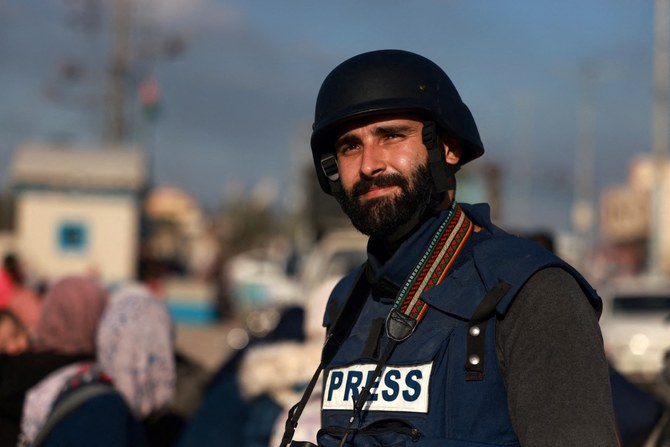
- Azaiza honored in “Icons” category for his work documenting the conflict in Gaza
LONDON: Palestinian photojournalist Motaz Azaiza has been named one of the “100 Most Influential People of 2024” by Time Magazine.
Azaiza was recognized in the “Icons” category for his work documenting the conflict in Gaza, with his photographs offering a rare insight into the realities faced by those living in the enclave.
“For 108 days, Motaz Azaiza acted as the world’s eyes and ears in his native Gaza. Armed with a camera and a flak jacket marked ‘Press,’ the 25-year-old Palestinian photographer spent nearly four months documenting life under Israeli bombardment,” the magazine’s entry description said.
Azaiza’s images offer a perspective rarely seen in international media, given Israel’s ban on foreign journalists entering Gaza.
The photographer took to social media after the announcement, saying the honor symbolizes more than just his individual achievements.
“I am really blessed to share my country name with me wherever I go or whatever I achieve,” he wrote on X.
The Palestinian Photographer..
— MoTaz (@azaizamotaz9) April 17, 2024
I am really blessed to share my country name with me wherever I go or whatever I achieve
For those who don’t recognize Palestine as a state, or for those who claim that it is their land.
Palestine gonna be free one day from Zionists and occupation.… https://t.co/1tqmxwahOP
During his time in Gaza, Azaiza captured images showing the destruction wrought by the conflict, and the resilience of its people.
His photographs, shared with over 18 million followers on Instagram, served as a crucial source of information, despite the risks involved.
Since leaving Gaza in January and relocating to Doha, Azaiza has continued to call for greater awareness of the crisis, and international intervention to halt the conflict.
“What is happening in Gaza is not content for you,” he was quoted as saying by the magazine. “We are not telling you what is happening … for your likes or views or shares. No, we are waiting for you to act. We need to stop this war.”
Since 1999, Time Magazine has published its annual Time 100 list, recognizing influential individuals in various fields.
Others who made this year’s list include singer Dua Lipa, Japanese animator Hayao Miyazaki, American footballer Patrick Mahomes, Formula One driver Max Verstappen and Qatar’s Prime Minister Mohammed bin Abdulrahman Al-Thani.
In November 2023, GQ Middle East named Azaiza as its Man of the Year, underscoring his role in inspiring positive change.
Azaiza’s nomination for the Time 100 list was submitted by Yasmeen Serhan, a staff writer at Time Magazine.
Gaza’s Mohammed Salem wins World Press Photo of the Year award with haunting image of woman cradling dead niece

- Picture was taken on Oct. 17, at Nasser hospital in southern Gaza, where families searched for relatives killed during Isralei bombing
- ‘I hope photo makes world more conscious of the human impact of war, especially on children,’ Salem said
AMSTERDAM: Reuters photographer Mohammed Salem won the prestigious 2024 World Press Photo of the Year award on Thursday for his image of a Palestinian woman cradling the body of her five-year-old niece in the Gaza Strip.
The picture was taken on Oct. 17, 2023, at Nasser hospital in Khan Younis in southern Gaza, where families were searching for relatives killed during Israeli bombing of the Palestinian enclave.
Salem’s winning image portrays Inas Abu Maamar, 36, sobbing while holding Saly’s sheet-clad body in the hospital morgue.
“Mohammed received the news of his WPP award with humility, saying that this is not a photo to celebrate but that he appreciates its recognition and the opportunity to publish it to a wider audience,” Reuters’ Global Editor for Pictures and Video, Rickey Rogers, said at a ceremony in Amsterdam.
“He hopes with this award that the world will become even more conscious of the human impact of war, especially on children,” Rogers said, standing in front of the photo at the Nieuwe Kerk in the Dutch capital.
Announcing its annual awards, the Amsterdam-based World Press Photo Foundation said it was important to recognize the dangers facing journalists covering conflicts.
It said 99 journalists and media employees had been killed covering the war between Israel and Hamas since the Palestinian militant group attacked southern Israel on Oct. 7 and Israel responded by launching a military offensive in Gaza.
“The work of press and documentary photographers around the world is often done at high risk,” said Joumana El Zein Khoury, the organization’s executive director.
“This past year, the death toll in Gaza pushed the number of journalists killed to a near-record high. It is important to recognize the trauma they have experienced to show the world the humanitarian impact of the war.”
Salem, a Palestinian aged 39, has worked for Reuters since 2003. He also won an award in the 2010 World Press Photo competition.
The jury said Salem’s 2024 winning image was “composed with care and respect, offering at once a metaphorical and literal glimpse into unimaginable loss.”
“I felt the picture sums up the broader sense of what was happening in the Gaza Strip,” Salem said when the image was first published in November.
“People were confused, running from one place to another, anxious to know the fate of their loved ones, and this woman caught my eye as she was holding the body of the little girl and refused to let go.”
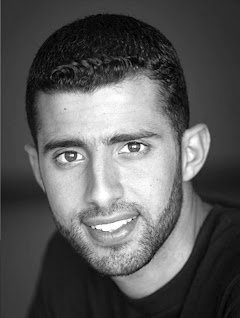
’PROFOUNDLY AFFECTING’
Salem’s wife had given birth to their child days before he took the shot.
The photograph is “profoundly affecting,” said jury member Fiona Shields, head of photography at Guardian News & Media.
The jury selected the winning photos from 61,062 entries by 3,851 photographers from 130 countries.
GEO photographer Lee-Ann Olwage of South Africa won the story of the year category with images documenting dementia in Madagascar.
The long-term projects category was won by Alejandro Cegarra of Venezuela for the series “The Two Walls” for The New York Times/Bloomberg.
Ukrainian photographer Julia Kochetova won the open format award with “War is Personal,” which documented the war in her country by weaving together pictures, poetry, audio and music in documentary style.
Arab League, OIC Islamic Broadcasting Union sign media protocol
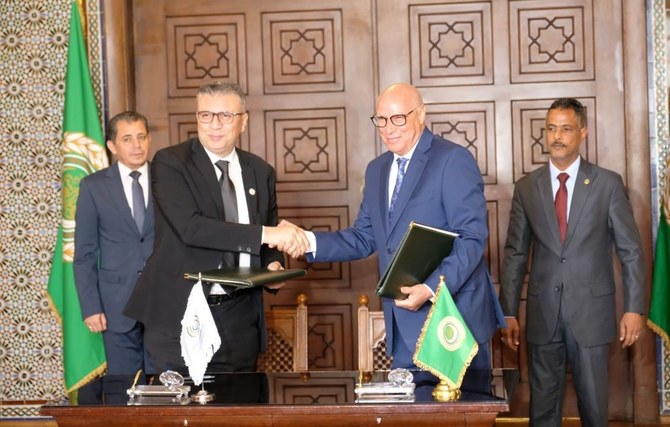
- Protocol encompasses various areas of collaboration, and focuses on training and capacity building in media and journalism
- Ambassador Ahmed Rashid Khattabi expressed optimism that the collaboration will contribute to promoting values of tolerance and moderation
CAIRO: The Arab League said that a media cooperation protocol will be signed between its Secretariat’s Media and Communication Sector and the OIC Islamic Broadcasting Union.
The Arab League added that “as part of efforts to cement ties between the General Secretariat of the League of Arab States and the Organization of Islamic Cooperation (OIC) Radio and Television Union, and in line with the General Secretariat’s commitment to fostering relations with regional and international organizations, a cooperation protocol will be signed between the General Secretariat’s Media and Communication Sector and the OIC Islamic Broadcasting Union.”
The protocol encompasses various areas of collaboration, and focuses on training and capacity building in media and journalism. It aims to bolster media exchange between the League of Arab States and the OIC, facilitate the sharing of expertise and knowledge in media practices, organize joint media initiatives, and conduct specialized training courses and workshops.
Ambassador Ahmed Rashid Khattabi, assistant secretary-general and head of the Media and Communication Sector, said that the protocol shows the commitment of both organizations to advancing professional cooperation.
He highlighted the importance of aligning with rapid technological advancements to meet the evolving needs of both entities.
Khattabi commended the significance of this protocol, stressing the vital role of intensified media cooperation between Arab and Islamic nations.
He expressed optimism that the collaboration will contribute to promoting values of tolerance and moderation, while rejecting extremism, and fostering deeper media and cultural exchanges.
The signing ceremony will take place at the headquarters of the General Secretariat of the League of Arab States in Cairo.
In response to the secretary-general’s directive, Khattabi will sign the cooperation protocol on behalf of the General Secretariat of the League of Arab States. Amr Ellissy, president of the OIC Radio and Television Union, will sign on behalf of the union.
Social media platform X blocked in Pakistan over national security, ministry says
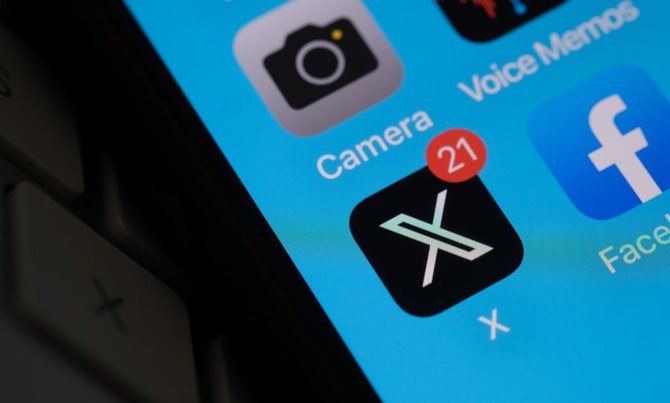
- Ministry accuses X of failing to address its concerns, says ban was in ‘interest of upholding national security’
- X has been blocked since country election in February, with activities critizing ban aims to stifle democratic accountability
ISLAMABAD: Pakistan’s interior ministry said on Wednesday it had blocked access to social media platform X around the time of February’s election on national security concerns, confirming a long-suspected shutdown.
Users in Pakistan have reported problems using X, formerly known as Twitter, since mid-February, but the government had made no official announcement on the matter until now.
The interior ministry mentioned the shutdown in a written submission to Islamabad High Court on Wednesday. Another court has told the government to reconsider the ban within a week, said Abdul Moiz Jafri, a petitioner and advocate.
“It is very pertinent to mention here that the failure of Twitter/X to adhere to the lawful directives of the government of Pakistan and address concerns regarding the misuse of its platform necessitated the imposition of a ban,” the ministry said in its court submission, which was seen by Reuters.
It said X had been reluctant to resolve the issue. X did not immediately respond to a Reuters request for comment on Wednesday.
“The decision to impose a ban on Twitter/X in Pakistan was made in the interest of upholding national security, maintaining public order, and preserving the integrity of our nation,” the ministry report said.
Access to X has remained limited since the Feb. 8 national election, which the party of jailed former prime minister Imran Khan says was rigged.
KHAN’S PARTY IS BIG USER OF X
Among Pakistan’s political parties, Khan’s party is the most prolific user of social media platforms, particularly after the country’s traditional media began censoring news about the ex-cricket star and his party ahead of the polls. Khan has over 20 million followers on X, making him the most followed Pakistani.
Khan says Pakistan’s military was behind his ouster as prime minister in 2022 and that it helped his opponents form the current government, despite candidates backed by his party winning most seats in February’s election. The military denies this charge.
He remains in jail on a number of convictions, most of which came days before the election.
Many government officials in Pakistan, notably Prime Minister Shehbaz Sharif, continue to use X — most likely through VPN software that bypasses the blocks.
The decision to temporarily block X was taken after considering confidential reports from Pakistan’s intelligence and security agencies, the ministry report said.
It said “hostile elements operating on Twitter/X have nefarious intentions to create an environment of chaos and instability, with the ultimate goal of destabilising the country and plunging it into some form of anarchy.”
Rights groups and marketing advertisers have raised concerns.
Digital rights activist Usama Khilji said the block on X seemed designed to hinder the democratic accountability which he said a platform with instant updates of real-time information enables, especially amid the allegations and evidence of rigging which surfaced following the election.
Marketing consultant Saif Ali said: “It has become nearly impossible to convince Pakistani advertisers to invest in Twitter for brand communications, due to the platform being throttled by governmental authorities.”



